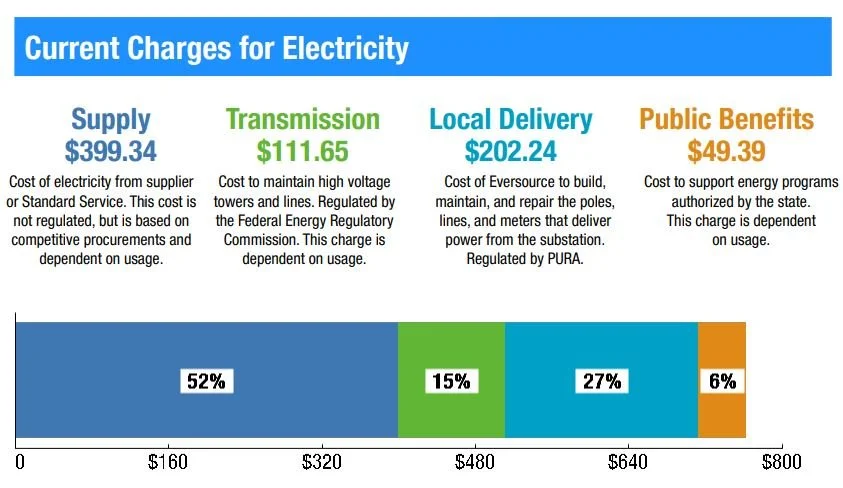How Much Am I Paying For My Electricity in Hartford Connecticut?
As a homeowner in Connecticut, deciphering the complexities of the electric bill can feel like navigating a labyrinth. By gaining insight into the factors that contribute to your electricity bills, you'll be better equipped to make informed decisions for managing your energy usage and ways to save money! This guide aims to show the components of your electric bill and help you gain clarity on what you are paying for.
Taking It from the Top
When you first open your electric bill, you might be tempted to focus on only the total amount due. After all, it’s the monthly pound of flesh Eversource is going to extract from you. What control do you have on how much you are getting charged?
More than you think!
Look closely, and you will see that Eversource will break your bill down into a few main components: supply, transmission, delivery and public benefits charges. Knowing the difference between these charges will help you to lower your energy costs even before you make the switch to solar.
Supply
When starting service with Eversource, you are automatically enrolled with them as the energy supplier. Every kilowatt-hour (kWh) you purchase from the utility is charged at a fixed price. From the bill below, we can see that this homeowner is being charged at a rate of $0.14714 for 2714 kWh purchased for that month.
During the winter, the utilities will increase the supply charge. During the summer, they will typically lower that same charge.
When graphing out the peaks and valleys, you will notice that your supply rate increases over time.
Did you know that you can lock in a lower rate from another supplier? It’s true! You can lock in a lower rate for 4 to 36 months. Many competitive suppliers play nicely with solar as well, allowing you to buy your power at a lower price and sell your excess solar energy for the full retail rate through CT’s netting tariff program.
Delivery
There are a few line items that make up these charges, but what are you really paying per kWh?
To determine this charge, we would subtract the fixed monthly charge ($9.62) from the Subtotal Delivery Services ($202.24). That means that you are directly paying $192.62 for 2714 kWh for the month, or $0.0709.
Supply, Delivery, Transmission and Public Benefits Charges
When you combine all components together, you can see that this sample homeowner is paying over $0.277 for every kWh they need. If you live in United Illuminating territory, that rate is even higher!
As you will recall, you can take steps to immediately lower your supply costs with competitive suppliers. But lowering your supply is just part of the equation. How can you effectively eliminate both your supply AND delivery charges?
When you go solar and take advantage of the netting tariff, your solar production will offset these charges. Connect with a solar installer to find out how many panels you will need to address your needs. Inform them of any future electric needs you are planning for the home (electric vehicles, heat pumps, etc), and you will be one step closer to controlling your energy costs!







